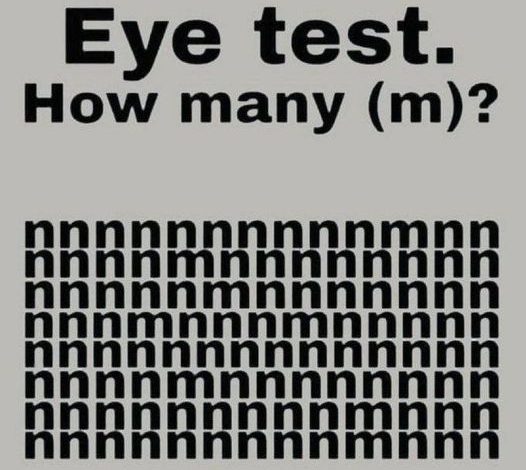
ADVERTISEMENT
The Importance of Visual Puzzles in Enhancing Cognitive Skills
Visual puzzles have been a popular form of entertainment and mental exercise for centuries, ranging from classic crosswords and jigsaw puzzles to more modern brain teasers found in mobile apps and websites. Among these, eye tests and visual puzzles like the one featuring a mix of the letters “m” and “n” are particularly effective at engaging our brains in ways that enhance cognitive skills. These seemingly simple activities can have profound effects on our mental agility, attention to detail, and overall brain health.
The Role of Visual Puzzles in Cognitive Development
Cognitive skills are the mental capabilities that we use to process information, reason, remember, and relate objects and ideas. Visual puzzles are a fun way to stimulate these cognitive functions. When you engage in a visual puzzle, your brain must decipher patterns, recognize differences, and focus on small details, all of which are essential components of cognitive development.
- Enhancing Attention to Detail: Visual puzzles require intense focus to distinguish between subtle differences. In the case of the “m” and “n” puzzle, the letters are so similar that it takes a sharp eye to differentiate them. This type of activity trains the brain to pay close attention to minute details, which is a valuable skill in both academic and professional settings.
- Improving Pattern Recognition: Our brains are wired to recognize patterns. This ability is crucial for making sense of the world around us, from reading to identifying faces. Visual puzzles like the “m” and “n” challenge help enhance pattern recognition by forcing the brain to sift through information quickly and accurately to identify the correct pattern.
- Boosting Concentration: Completing a visual puzzle requires sustained concentration. The more complex the puzzle, the longer you need to focus, which in turn strengthens your ability to concentrate on tasks. This skill is particularly beneficial in a world full of distractions, where the ability to maintain focus is increasingly valuable.
- Stimulating Problem-Solving Skills: Visual puzzles often involve problem-solving. Whether it’s figuring out where a piece fits in a jigsaw puzzle or identifying the “m” among “n” letters, your brain must develop strategies to solve the problem efficiently. This process is akin to problem-solving in real-life situations, where you need to evaluate information, consider possible solutions, and choose the best course of action.
The Science Behind Visual Puzzles and Cognitive Function
Scientific studies have shown that engaging in regular cognitive challenges like visual puzzles can have lasting effects on brain health. One study published in the journal Neurology found that engaging in mentally stimulating activities, including puzzles, can help delay the onset of cognitive decline in older adults. The study suggests that the mental exercise provided by these activities helps build up cognitive reserve, which can help the brain function effectively even in the face of age-related changes.
Another study from the Journal of the American Geriatrics Society found that older adults who regularly engaged in puzzles and similar activities showed improved memory and cognitive speed. The repetitive nature of these activities is believed to reinforce neural connections, making the brain more resilient to cognitive decline.
The Benefits of Visual Puzzles Across Age Groups
While the cognitive benefits of visual puzzles are well-documented in older adults, they are equally important for younger individuals. Children who engage in visual puzzles develop essential skills such as spatial awareness, hand-eye coordination, and problem-solving at an early age. These skills lay the foundation for more complex cognitive tasks later in life, such as mathematics and reading comprehension.
ADVERTISEMENT
For adults, visual puzzles provide a much-needed mental break from daily routines, offering a fun way to relax while also keeping the brain sharp. For professionals, these puzzles can be a useful tool for improving focus and problem-solving abilities, which are critical in fast-paced work environments.
Incorporating Visual Puzzles into Daily Life
Given the numerous benefits of visual puzzles, incorporating them into your daily routine can be a simple yet effective way to enhance cognitive function. Here are a few ways to make visual puzzles a part of your life:
- Morning Brain Teasers: Start your day with a quick visual puzzle to jumpstart your brain. Whether it’s a crossword puzzle over breakfast or a quick game on your phone during your commute, this can help set a productive tone for the day.
- Puzzle Apps: Downloading puzzle apps on your phone or tablet can provide a convenient way to engage in mental exercise throughout the day. Many apps offer a variety of puzzles, from word searches to visual challenges like the “m” and “n” test, allowing you to choose based on your mood and time constraints.
- Family Puzzle Time: Make visual puzzles a family activity. Set aside time each week to work on a jigsaw puzzle or play a game that involves visual challenges. This not only promotes cognitive health but also fosters family bonding.
- Office Challenges: Bring visual puzzles into the workplace as a fun way to stimulate team members. Organizing a weekly puzzle challenge can promote team building while also sharpening employees’ cognitive skills.
Conclusion
Visual puzzles, like the “m” and “n” eye test, are more than just entertaining pastimes. They are powerful tools for enhancing cognitive skills across all age groups. By incorporating visual puzzles into your daily routine, you can boost your attention to detail, pattern recognition, concentration, and problem-solving abilities, all while keeping your brain healthy and resilient. Whether you’re a child developing foundational skills or an adult looking to maintain cognitive sharpness, visual puzzles offer a simple, enjoyable, and effective way to exercise your brain.
Keywords: visual puzzles, cognitive skills, attention to detail, pattern recognition, problem-solving, brain health, cognitive development, puzzle apps, mental exercise, eye test.
ADVERTISEMENT



